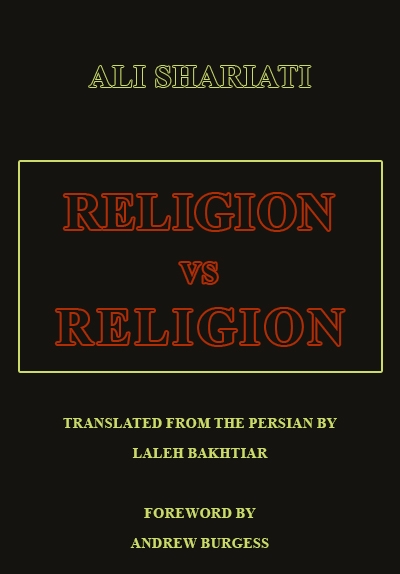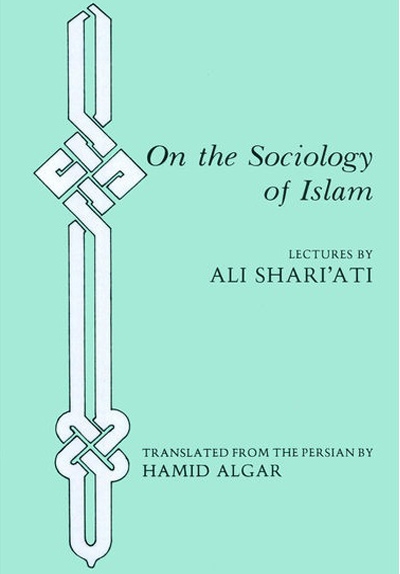Religion vs. Religion

Author(s): Ali Shariati
Publisher: ABJAD Book Designers and Builders
Published on: Rajab, 1413 1993-01
ISBN: 871031 00 1
No. of Pages: 81
Foreword
On Drawing a Line 1
Reflecting on his experience as an engraver, William Blake once remarked that, in art as in life, the decisive factor is how you draw a line. "What is it that distinguishes honesty from knavery, but the hard and wirey line of rectitude and certainty in the actions and intentions? Leave out this line, and you leave out life itself; all is chaos again, and the line of the almighty must be drawn out upon it before man or beast can exist."
It is a long way from Blake, the eighteenth century English artist and poet to Ali Shariati, the twentieth century Iranian sociologist and Islamologist; yet not impossibly far. For, despite their differences, the two share a moral passion leading them to draw lines in their writings calling for religious and social reform. A reader may not like where or how a line cuts, but there it is, bold and uncompromising, leaving one no choice but to stand on one side or the other.
The line Shariati draws in the following speeches is between two religions, a "religion of revolution" and a "religion of legitimation." The difference between them is sharply drawn: the first is a religion working to overcome differences in class and economic status, while the second is a religion legitimating and perpetuating such differences. As opposed to some socialists who draw the line between religion, as supporter of class divisions, and non-religion, which overcomes these divisions, he places the dividing-line within religion itself. From his perspective, it is thus not religion itself that needs to be rejected as the "opium of the people," but only one type of religion, the "religion of legitimation," while true religion remains unscathed.
The consequences of this impressive analysis are far-reaching. Not for nothing has he been called the ideological leader of Iran's "Islamic Revolution." Since World War II the Muslim world has been shaken by two powerful forces, socialist ideology and, more recently, what is now called Islamic fundamentalism. The line Shariati draws binds these two movements together: true Islam, he says, is true socialism, and true socialism is true Islam. It is the kind of slogan for which thousands of people have been prepared to die, and for which thousands have already died.
Shariati's designation as a "sociologist" will be puzzling to American readers, who are accustomed to an academic science of sociology claiming to be descriptive rather than ideological. Certainly one looks at his pages in vain for the charts of statistical correlations that characterize American sociology. His life, also, shows as much of political activism as of academic detachment. Born in 1933, he early joined the "Socialist Movement of Believers-in-God" and by the 1950's he was already active in the movement for the nationalization of the Iranian oil industry. When he earned his B.A. in French and Persian in 1958 and left for graduate study in France at the Sorbonne, his double mission continued. His doctoral dissertation (1963) was a translation into French of a medieval Persian text. During this same period, however, he also
translated into Persian Ernesto "Che" Guevara, Jean Paul Sartre, and Franz Fanon, and he helped found the Freedom Movement of Iran, Abroad. On his return to Iran in 1964 he was jailed for six months. From then on he held various teaching positions until he was sent into forced retirement in 1969. In 1972 he was arrested for his activities, and he was not released until an international outcry compelled the government to give him his freedom in 1975. For the next two years he was under house arrest. In 1977 he left Iran for England, where he died under mysterious circumstances in a relative's home. Clearly this was not the typical life of a professor of sociology.2
The key to Shariati's understanding of sociology is to be found in his affinity with Guevara, Fanon, and Sartre. Both of the first two took active part in a socialist struggle - Guevara in Latin America, and Fanon in Algeria; and even the more professorial Sartre found himself frequently under arrest in France for political demonstrations. Like Karl Marx, all of these men felt called upon not just to understand the world but to change it.
But if Shariati is an unorthodox sociologist, he is just as unorthodox as a Marxist socialist. The "Socialist Movement of Believers-in-God" differed from Marx in much more than their belief in God. Their faith was rooted in a literal interpretation of the Quran as the Word of God, a basis that puts them at odds with Marxism from the start. Classical Marxism, which begins as a kind of Christian heresy, does not quite know how to account for Islam. By Marxist theory the ideal state is not supposed to be proclaimed in the Arabian deserts during the seventh century A.D., and a proletarian revolution should not erupt there either.
In many respects, Shariati's nearest allies are to be found not among the secular European socialists, whom he frequently cites, but among the Latin American Christian "liberation theologians," of whom he does not seem to be aware. Some of these liberation theologians, such as Camilo Torres (Columbia), Carlos Alberto ("Frei Betto"), Libanio Christo (Brazil), and Gustavo Gutierrez (Peru), were beginning to attract world notice by 1970, the year in which Shariati gave the following speeches.3 Other liberation theologians include Juan LuisSegundo ( Uruguay), Hugo Assmann (Brazil), Elsa Tamez (Costa Rica), Jose Miguez Bonino (Argentina), Jose Porfirio Miranda (Mexico), Ernesto Cardenal (Nicaragua), Dom Helder Camara (Brazil), and Leonardo and Cleodovis Boff (Brazil). Several of these, or their followers, suffered imprisonment or death. It would not be stretching the term to call them all socialist "Believers-in-God". Like Shariati, they have held passionately to their faith and its social consequences, at the same time as they have felt free to deviate from classical socialist teachings at many points. The closest analogue to Shariati among the Latin American liberation theologians comes in Enrique Dussel's historical analysis of the colonial expansion by European powers. In his history of the church in Latin America, Dussel uses a hermeneutical model based on a division between the oppressors and the oppressed. Since both oppressors and oppressed claim to interpret their actions in religious terms, the way the line is drawn between them is strikingly reminiscent of Shariati's division between the two kinds of religion.
The Western reader of this book may be surprised at the way in which Shariati draws his main harsh examples of oppression out of religions remote from Islamic Iran, such as Greek polytheism, Christianity (especially medieval Catholicism), Judaism (in the person of its leaders, the Pharisees or rabbis), Zoroastrianism, and occasionally other religions such as Buddhism. This practice may well puzzle readers, who will wonder how a critique of false religion described in terms of an attack on Zoroastrianism or Christianity is to be understood as a call to social revolution in Iran today. Surely, such readers would say, we cannot suppose that his Iranian listeners were in danger of succumbing to the lures of Christianity, for example, especially medieval Christianity, or that they needed to be warned against the social structure it is supposed to represent. Indeed, one can hardly suppose that if his Iranian audience had any real familiarity with non-Muslim faiths they would have been satisfied with some of the characterizations provided. Why then should a critique mainly of non-Islamic faiths and their social structures be taken - as in fact it was - as a call for change in contemporary Iran?
Part of the problem here might be overcome through a wider acquaintance with Shariati's writings. Although his productivity is enormous, scores of his writings have not been translated in any language and only a few have been translated into English. At the conclusion of his meditational work, Hajj: Reflections on its Rituals, for example, he points out how even these rituals at the heart of Islam have sometimes been deceptively twisted around to serve false religion. In another book, Alid Shi'ism/Safavid Shi'ihsme, criticizes tendencies within his own branch of Islam. Through such writings, he has gained a reputation in Iran as a relentless critic of false religion within the Islamic tradition itself.
An equally important factor is the political situation in Iran when these speeches are delivered. In 1970 the struggle with the Shah is well underway, and there are certain criticisms of the existing society that dare not be uttered in public. His Iranian listeners, however, are able to de-code easily what he says. They are aware, much better than Europeans or Americans would be, that the confrontation between Ali and his opponents described in these speeches was not the end of the struggle within Islam between the kind of religion calling for revolution and the kind of religion legitimating oppression. His listeners know Islamic history-of the opulent lives led by the Baghdad caliphs described in the "Arabian Nights," while the common people groaned in poverty; of wars of conquest in the name of Allah; of peoples dragged off into slavery, the men slaughtered or put to forced labor, the women thrown into harems; of oppression in terms of race and of class, all justified in their day by those who claimed to be Muslim mullahs. That is why Shariati's speeches can be understood as calls to revolution. Behind the stories of oppression in Europe and pre-Muslim Iran, the listeners can hear their own.
Indeed, Shariati's own life fills in what is mission in what he says. Surely it is hardly credible he would have had to spend years of life in prison, and other years in exile or under house arrest, simply for criticizing remote peoples and their faiths or for advocating a return to traditional Islam. The reason he is seen as a revolutionary is that the line he draws between a religion of revolution and a religion of legitimation divides the social structure of Iran itself. When he inveighs against medieval Roman Catholic authorities, his real target is the Shah. He does not have to say this, for his Iranian listeners will understand.
This is the pathos of the speeches he delivers on two kinds of religion. Here is a man under severe political pressure, shortly to face years of prison, house arrest, and death. His words, however, are not about himself, but about drawing a line between the false and the true, and for that line he is willing to pledge his life.
Andrew Burgess
Albuquerque, NM
November 3, 1988
Endnotes to the Foreword
1. "A Descriptive Catalogue," Poetry and Prose of William Blake, ed. Geoffrey Keynes (London: Nonesuch Press, 1948), p. 617.
2. See "An Outline of Dr. Shariati's Life and Career," in What is to be Done? Edited and Annotated by Farhang Rajaee (Houston: Institute for Research and Islamic Studies, 1986), pp. xvii-xix.
3. See for example Camilo Torres, Camilo Torres' Life and Message (Springfield, Ill.: Templegate, 1968; Carlos Alberto Libanio Christo, Against Principalities and Powers: Letters from a Brazilian Jail, (Maryknoll: Orbis, 1975); Gustavo Gutierrez, A Theology of Liberation, (Maryknoll, New York: Orbis, 1973).
4. A History of the Church in Latin America: Colonialism to Liberation, 1492-1979 (Grand Rapids, Mich.: Eerdmans, 1981).
5. The English translation of this book and the previous, Hajj: Reflections on its Rituals are to be published in the Spring of 1989 by ABJAD, Book Designers and Builders.
(© Laeh Bakhtiar)
(Disclaimer: This material is made available here strictly for educational purposes)

